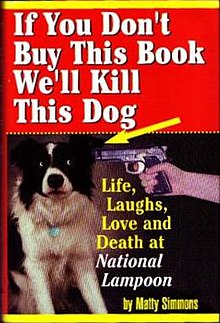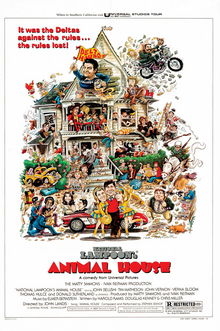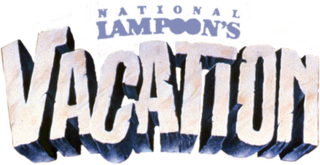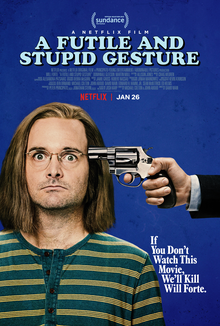 | |
| Author | Matty Simmons |
|---|---|
| Country | United States |
| Language | English |
| Genre | Nonfiction |
| Publisher | Barricade Books |
Publication date | 1994 |
| Media type | |
| Pages | 335 |
| ISBN | 978-1569800027 |
| OCLC | 29637682 |
If You Don't Buy This Book, We'll Kill This Dog: Life, Laughs, Love, and Death at National Lampoon is an American book that was published in 1994. It is a history based on the author Matty Simmons' involvement with National Lampoon magazine and its various spin-offs, including the film Animal House . (The title of the book is a reference to an infamous 1973 National Lampoon cover featuring a dog looking worriedly at the muzzle of a revolver pressed to its head, with the caption: "If You Don't Buy This Magazine, We'll Kill This Dog".) [1]
Dating back to National Lampoon's debut in 1970, Simmons was the chairman of Twenty First Century Communications, Inc., of which the original National Lampoon, Inc. was created as a subsidiary company. From 1976 to 1977, Simmons was the publisher of the magazine, and from 1978 for a period of time, he was the publishing director. [2] Simmons's film credits included being the producer of National Lampoon's Animal House and the National Lampoon's Vacation film series. [3]
The book "covers National Lampoon's turbulent editorial periods of fluctuating staff and private vendettas, its haphazard film projects..., its recurrent controversy — from libel suits by Walt Disney and Liza Minnelli to advertising and newsstand boycotts spurred by guardians of public morality — and finally its disastrous takeover in the late '80s by a group led by one of the actors from Animal House." [4]
In a contemporaneous review, Publishers Weekly referred to the book as a "chatty, anecdotal account," writing:
[It] also serves as a reminder that, even in its most freewheeling, iconoclastic forms, the entertainment business is just that — a business.... Simmons has worked with many of the great humorists of our time, and his colorful stories about P. J. O'Rourke and John Belushi — to name only two — make amusing reading. But money remains one of the chief concerns of Simmons's memoir. While he is proud of the magazine's funniest moments, the talents it nursed, and the successful projects it spawned ... he also makes it plain that success in the publishing and film industries is dependent partly on the ability to wheel and deal. Bad or unlucky financial planning brought the company repeatedly to the brink of bankruptcy, and the latter part of Simmons's book is mired in accounts of endless power struggles, takeover bids, and financial concerns. But as a cautionary tale on surviving the vicissitudes of the entertainment biz, the book is instructive. [5]
Kirkus Reviews wrote of the book:
Matty Simmons, the ousted chairman and founding father-figure of National Lampoon, has the corner office in his personal history of its first two twisted decades of reinventing American humor. The National Lampoon is the closest thing the Baby Boom has to an institution for its sense of humor, having produced, under Simmons, some of the most tasteless and hilarious writing, theater revues, radio shows, and movies. Its multitalented, multimedia alumni continue to make jokes — the book's cast of characters reads like Michael Ovitz's Rolodex. Simmons's "first professional relationship with the joke," however, was writing gags for Walter Winchell... But Simmons's chronicle relies too often on oddly mundane showbiz anecdotes and shaggy dog stories, as if there were a generation gap in his sense of humor. Simmons does not rise to the numerous occasions for satire and sick jokes, though the Lampoon's history is as warped and blackly comic as any of its creations. [4]














